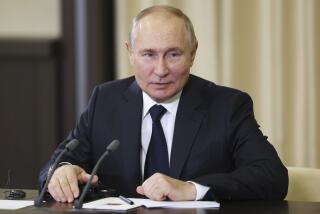Gates says Taiwan arms sales serve to keep the peace
- Share via
Reporting from Washington — Defense Secretary Robert M. Gates defended U.S. arms sales to Taiwan, saying Saturday that the weapons transfers are meant to enhance stability in Asia by countering mainland China’s military buildup.
Gates said in a speech at an annual security conference in Singapore that the arms sales are part of a longstanding U.S. practice. The aid is opposed by Beijing, which this week withheld an invitation sought by Gates for a visit to mainland China while he is traveling in the region.
Gates’ comments reflect the military tension that has continued even as commercial ties between the two economic superpowers deepen. In his speech Saturday, Gates voiced regret that the U.S. and mainland China have not been able to build a “sustained and reliable” military relationship.
He reiterated that the United States does not support independence for Taiwan, which China considers a breakaway province, and merely wants to encourage regional stability and prevent any violent conflict.
“Because China’s accelerating military buildup is largely focused on Taiwan, U.S. arms sales are an important component of maintaining peace and stability in cross-strait relations and throughout the region,” Gates said, according to a copy of his prepared text that was provided to reporters.
Although he acknowledged that Beijing sees the arms sales differently, Gates noted that they have not impeded trade relations or economic discussions with the U.S.
“Only in the military-to-military arena has progress on critical mutual security issues been held hostage over something that is, quite frankly, old news,” Gates said. “It should be clear to everyone now — more than 30 years after normalization — that interruptions in our military relationship with China will not change United States policy toward Taiwan.”
Early this year, mainland China canceled military cooperation projects after the U.S. announced a $6-billion arms deal with Taiwan.
Gates said the cooperation ventures are important because a sustained U.S.-China relationship could prevent misunderstanding and miscalculation. Without an avenue for military cooperation that is not regularly cut off over policy disagreements, it will be difficult for the two countries to create a positive relationship, he said.
“There is a real cost to any absence of military-to-military relations,” Gates said. “I believe they are essential to regional security.”
Gates also said the South China Sea, where mainland China, Taiwan and several other nations have competing territorial claims, is an area of “growing concern.”
Last year, a U.S. Navy surveillance ship hunting for submarines was harassed by a group of Chinese naval vessels, raising tensions between Washington and Beijing.
Gates said it was essential that “free and unhindered” economic development continue in the area.
He also sought to rally support for South Korea, saying North Korea’s alleged sinking of the patrol boat Cheonan in March was part of a pattern of “reckless behavior.”
South Korea submitted a letter Friday to the U.N. Security Council demanding that North Korea admit sinking the ship. The letter says Pyongyang is endangering regional stability and asks the council to take action to deter any future aggression.
In Singapore, Gates said other Asian nations share responsibility for addressing Pyongyang’s conduct.
“Inaction would amount to an abdication of our collective responsibility to protect the peace and reinforce stability in Asia,” he said. “North Korea must cease its belligerent behavior and demonstrate clearly and decisively that it wants to pursue a different path.”






